“I never thought this day could come! I never thought I could wait until this day finally comes!” After flying halfway around the globe, Mary Taylor Previte, an 83-year-old American lady, eventually met, in Guiyang, China, Wang Chenghan, a 91-year-old man, the hero who parachuted to Weihsien Internment Camp and saved her life 71 years ago.
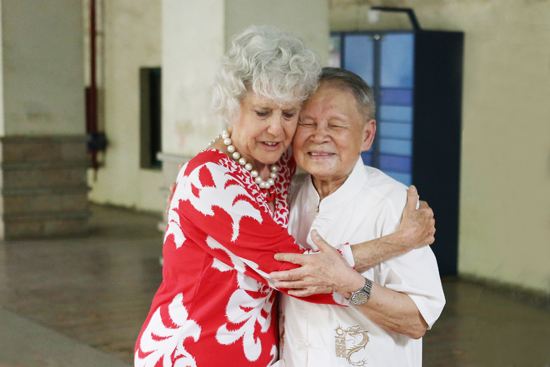
When Mary meets Wang Chenghan, they two hug each other excitedly. (Shot by Qi Xiang)
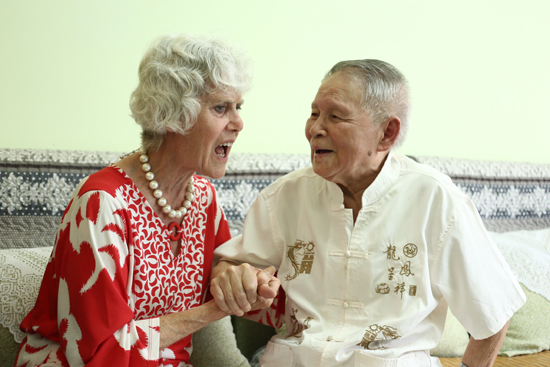
When reminiscing about the then experiences in Weihsien Internment Camp, Mary and Wang Chenghan hold their hands excitedly. (Shot by Qi Xiang)
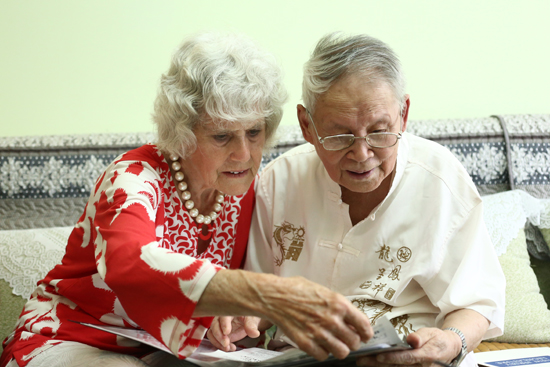
Mary is introducing the letters of thanks she brought to Wang Chenghan. (Shot by Qi Xiang)
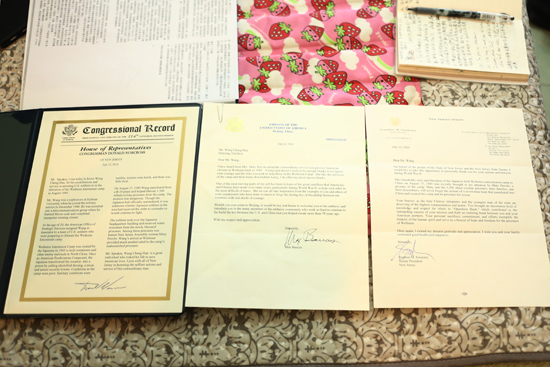
Letters of thanks written by some who were rescued from Weihsien Internment Camp and entrusted to Mary to bring to Wang Chenghan (Shot by Qi Xiang)
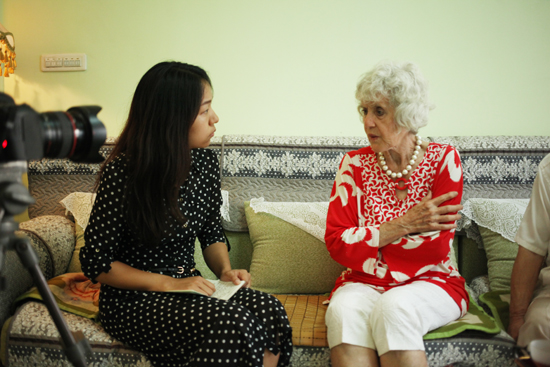
Mary Taylor Previte from New Jersey, U.S. is being interviewed by a journalist from Dazhong Website. (Shot by Qi Xiang)
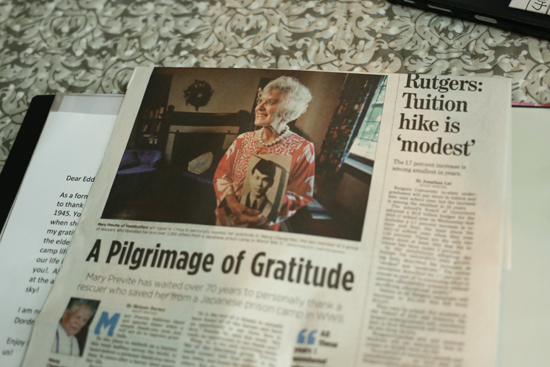
A Report on Wang Chenghan and Mary in The Philadelphia Inquirer in the United States with a title of A Pilgrimage of Gratitude (Shot by Qi Xiang)
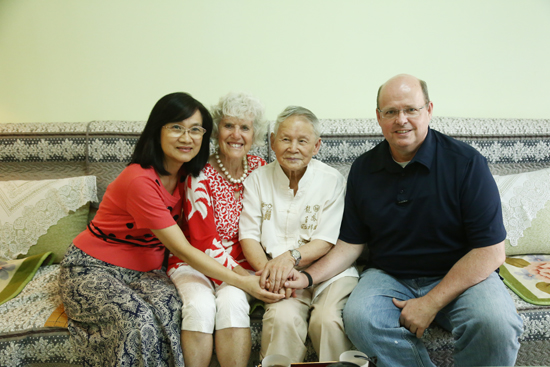
Wang Chenghan and Mary and their families take a group photo to mark the occasion. (Shot by Qi Xiang)
By Fan Sisi and Qi Xiang
Accredited journalists from Dazhong Website
“I never thought this day could come! I never thought I could wait until this day finally comes!” After flying halfway around the globe, Mary Taylor Previte, an 83-year-old American lady, eventually met, in Guiyang, China, Wang Chenghan, a 91-year-old man, the hero who parachuted to Weihsien Internment Camp and saved her life 71 years ago. In 1945, a “Duck Action Team”composed of 7 members, including Wang Chenghan, rescued Mary and other 1500 aliens in Weihsien Internment Camp set up by Japanese troops in Shandong. Mary used to be a female state senator in New Jersey. Since the 1990s, she has always been looking for these rescue team members to convey her thanks to them one by one in person. Wang Chenghan is the last team member she’s found. So far, she’s finally accomplished her wish of gratitude for several decades. The accredited journalists from Dazhong Website recorded the whole scene of this moving occasion.
Reminiscing about the rescuing scene:
Seven heroes dropping from the clouds made the whole internment camp crazy.
“Oh my goodness! That is my hero!” At 3:30 p.m., 27th of July, Mary, who just got off the plane and was accompanied by her family, came to Wang Chenghan’s home in Guiyang. She quickly saw Wang Chenghan, who was coming downstairs to welcome her. They two almost rushed to each other and held each other’s hands, screaming and laughing, just like children, followed by a tight hug. “I never thought I could wait until this day finally comes, never ……” Mary repeated this sentence over and over again. Then, she turned around and announced: “This is Mr. Wang! He is my hero!”
During World War II in the early 1940s, the Japanese troops reconstructed a monastery in Weihsien (i.e. Weifang City in Shandong Province today) into an internment camp to imprison aliens. Over 2000 aliens from Europe and the United States (500 of whom were released for an exchange of prisoners later), including 327 children, were collected from all parts of China and imprisoned in this place. At that time, Chefoo School, where Mary, who was less than 9 years old, studied, was occupied by the Japanese troops. Over 200 teachers and students were imprisoned in Yantai for nine months at first, and then they were brought to Weihsien. Thus, Mary, along with her brothers, sisters and her grandfather, started their life of being imprisoned in Weihsien Internment Camp. It lasted for 3 years. During this time, they not only went short of food and clothing and had to endure the extremely severe hygiene conditions for a long period of time, but were deprived of personal freedom as well. Mary couldn’t see her parents for around 5 years.
The tough time ended in the summer of 1945. “August 17th, 1945 is the day I will never forget.” Mary said to the journalists of Dazhong Website. She had a stomachache that day so she lay in a ward in the internment camp. All of a sudden, she heard sounds like the roar of an aircraft from the outside of the window. When she rushed to the window, she saw an aircraft flying lower and lower. There was a symbol of American flag on that plane. Immediately, the whole internment camp was crazy. People took off their shirts, waved them and rushed outside the doors. Mary also hurried downstairs. “Can you imagine it? My stomachache cured itself automatically!” She said smilingly. Later, people saw parachutes falling from the aircraft down to the fields outside the camp. They were the 7-member action team sent by the United States to come to their rescue. And Wang Chenghan was the only Chinese in this action team. Crowds were as joyful as larks. They broke through the defending lines guarded by the Japanese troops and rushed to the 7 people, crying, hugging, and dancing. And then they shouldered the 7 rescuing people and walked to the gate of the internment camp.
Having too much gratitude to tell:
Admiring very much the benefactor’s risking his life to come to her rescue, Mary brought special letters of thanks from the United States.
“You know what, Mr. Wang had never tried parachuting before. However he did it when rescuing us. He is our hero!” Mary said in admiration, holding Wang Chenghan’s hand tightly in his home. When leaving the internment camp, the girl, who was less than 13 years old, did not know this detail. When she got to know this many years later, her admiration for this Eddie Wang (they all called Wang Chenghan Eddie at that time for his English name was Eddie Wang) was even enhanced. “It was under the guard of so many Japanese soldiers in the internment camp that he risked his life to rescue us, whom he hadn’t known before,” said Mary in excitement.
“I wonder how you took part in that rescuing action team dispatched by the United States. What was your first impression of us, the imprisoned people in the internment camp? What was the mission you received before getting on the aircraft that day? When did you go back home after we left the internment camp? …” After the exciting moment of the reunion, Mary, just like the then lovely girl, couldn’t wait to raise a battery of questions. She was curious about everything Wang Chenghan experienced in that rescue.
“I was a soldier back then. In 1943, I was enrolled into the Department of Physics in Sichuan University. I decided to join the army to serve my country the next year…” In Mary’s expectation, Wang Chenghan, a 91-year-old man, introduced how he gave up his academic studies and joined the student volunteer units in the National Revolutionary Army, how he learned to send a telegraph in the army, how he got into the interpreter training class set up by the Bureau of Foreign Affairs of the Kuomintang, and how he was recruited by the United States Office of Strategic Services and worked as interpreter in the special action team. Mary was all ears when listening, expressing her surprise and admiration every now and then. When hearing the thrilling parts of Wang Chenghan’s introduction, she couldn’t help hugging Wang Chenghan again, saying, “You are a hero.”
Mary brought a special gift for the meeting with Wang Chenghan — thanks from Stephen M. Sweeney (Chairman of New Jersey Senate) and Max Sieben Baucus (ambassador of the United States Embassy in China). In his letter of thanks, Stephen said, “as the interpreter and the youngest member of the then seven-member action team, your heroic and brave behaviors deserve our highest praise and admiration. Your contribution, commitment and endeavor were not only the example of human beings’ strong will, but also the lighthouse of freedom and hope of those in Weihsien Internment Camp.” Max said in his letter of thanks that, during the period of World War II, both the Chinese and American people suffered great sacrifice, that they rendered assistance to each other during those tough years, and that Wang Chenghan’s heroic and brave behaviors and other Chinese people’s efforts had inspired them greatly. He also expressed his wish that he would introduce Wang Chenghan to his colleagues in the United States Embassy in China, those who have made unremitting efforts, just like Wang Chenghan, in establishing the friendship bonds between China and the United States.
Moreover, learning that Mary was visiting “the last hero” in China, a dozen survivors rescued from Weihsien Internment Camp wrote letters to Wang Chenghan. U.S. Rep Donald Norcross put Wang Chenghan’s name into the Congressional Record for his “selfless behaviors and contributions”. Mary handed these letters to Wang Chenghan. With their presbyopic glasses on, the two old people browsed the letters conscientiously. Wang Chenghan gently touched these letters with his trembling hands and couldn’t help reading them softly.
Reminiscing about the life in Weihsien Internment Camp:
The children ate egg shells for nutritional supplements; the teachers protected the children from knowing the “bad things”.
“When in Weihsien Internment Camp, what frightened and scared me most was the Japanese people’s dogs’ killing our cat.” Mary still felt very sad when talking about that even after a gap of over seventy years. The Japanese guards raised some big wolfhounds in Weihsien Internment Camp. The wolfhounds often followed the Japanese soldiers to go on patrol in the camp, which made the teenage girl Mary very frightened. Back then, the principal in Mary’s school raised a kitten called Victoria. Mary described it as a “very soft, very docile and lovely” cat. The kitten often kept her company to go to sleep. One night, not having fallen into sleep, Mary heard the footsteps of the Japanese soldiers on patrol and the sounds of the wolfhounds outside the window. All of a sudden, the kitten’s shrill screams were heard just from outside the house. That is Victoria! The wolfhounds assaulted and killed it! Mary was too scared to make any single sound. She cuddled up in a heap on her bed. “I think they cleared up the bloodstains before the morning came for fear that we children should see it.” Mary said in sadness that the incident kept everybody sad for quite a long time.
Compared with such bloody incidents which were not frequent, the severe living conditions worried Mary and her fellow sufferers more. As Mary said, the food in Weihsien Internment Camp was awful. More undesirably, the supply of food later was shrinking constantly. What they got every day were merely several slices of dry bread. The rare meats were mostly rotten, still less the meats were overrun by the disastrous mice and flies. Since the children did not get adequate food, the teachers racked their wits and turned the blankets into trousers for children to live through the chilly winters. Wang Chenghan still remembered clearly what he saw when he parachuted to the ground and a large number of fellow sufferers rushed out: “Everybody was only skin and bone. Many of them had no shoes to wear.” Mary told the journalists of Dazhong Website that the doctors (also fellow sufferers) were worried so much that malnutrition might influence the kids’ physical development. To supplement calcium for children, adults even conserved the egg shells (the eggs were bought by the fellow sufferers at the risk of their life from the peasants outside the internment camp wall), dried them, grinded them into powder, and then fed them to the children bit by bit.
Even in such severe conditions, the teachers still kept teaching the children including Mary. In addition, they demanded that the children should set high standards on themselves and never give up. In Mary’s impression, Weihsien Internment Camp was not a place glutted with violent, bloody or other scary things. “Maybe some awful things happen. But the teachers were always protecting us. They never told us children about the bad things.” Mary said that she once went to find, many years later after being rescued, the teachers who had been in the internment camp, and got to know that the teachers had been praying every night, fearing that the Japanese soldiers would assemble everyone and shot them to death. However, the children were nicely protected because the teachers never said a single word to them about the fear and scare of death.
Giving an account of “the pilgrimage to her hero” for over ten years:
It’s a miracle to meet with my benefactor alive; China is my mother.
“It’s a miracle,” remarked Mary to the journalists of Dazhong Website upon her finding the last hero of the rescuing team and meeting him.
In the 1990s, Mary started to look for the seven members of the action team. With the help of her friends, she found the widows of two members and then succeeded in meeting another four members. However, after consuming so much time and energy, she still could not get a line on the Chinese member. “I have no idea where he went after the war, whether he was in China or even whether he is alive or not now. As you know, it is really very hard to find a Mr. Wang among billions of Chinese people.”
And then one day in March, 2015, Wang Qian, Wang Chenghan’s grandson, coincidently read an article written by Mary on a website in the United States, saying that Mary was still looking for a Chinese man called Eddie Wang. Wang Qian read the story over and over again and became more and more convinced that the person Mary had been looking for was his grandfather. As a result, he wrote a letter to Mary.
“I remember that after asking about sixteen questions, she was finally sure that I was the one she had been looking for. Later on we made a phone call. We got extremely excited.” With a smile on his face, Wang Chenghan reminisced about his getting in touch with Mary in April and May of 2015. Those questions were about the rescue in Weihsien Internment Camp. Only those who lived through the entire event could be familiar with the rescue mission. “I know all the correct answers and Mr. Wang answered the questions quickly and all were correct. He is the hero I am looking for,” Mary added happily.
“I’ve realized a dream that I thought would never come true. There is nothing better than that.” Mary describes her entire process of finding the seven rescuing team members as “the pilgrimage to her hero”. Right now she’s completed the pilgrimage successfully. “God bless me for finding you. I am alive and so are you. We’ve finally met!”In excitement, Mary’s eyes were moist with tears. “Fate does all the things!” said Wang Chenghan with emotion. “Mr. Wang should have received the honor of a hero earlier.” Mary said, “I hope that more people will know about his stories. If there are more nice stories like his, the whole world will be better. That is because we all work hard together and we are with each other together.”
Never give up hope. Mary still remembers that even during the hardest times, the fellow sufferers in Weihsien Internment Camp firmly held the belief that the final victory belonged to us. They even made preparations for celebrating the victory in advance. There was an orchestral band composed of dozens of fellow sufferers in the internment camp. Mary recalled that the band would secretly rehearse the new song every Tuesday evening, the one made up of some paragraphs from the national songs of the the main allies,the United States, Britain and the Soviet Union,as well as representative songs of China. To avoid the close supervision of the Japanese troops, the band even mixed some rhythms of extolling the Kingdom of Heaven. On August 17th, 1945, when the seven paratroopers dropped from the clouds, the people in Weihsien Internment Camp, wild with joy, all played this song, which they had rehearsed so long. It was not only a song celebrating the over 1500 fellow sufferers’ regaining freedom again, but also a song celebrating the victory of the allied countries. “Mr. Wang is my hero and my friend, forever and ever!” Mary said emotionally that we won that war together then, and that a profound friendship is still kept between our nations and between our peoples. May this friendship last forever!
When someone said “Welcome to China” to Mary in the interview, Mary corrected it immediately by saying: “No, we should say I’ve come back to China. I was born in Kaifeng, Henan Province, China. I remember kissing the land when I first came back to China because China is my mother and I was kissing my mother.”
“You are my sunshine my only sunshine. You make me happy when skies are gray……”Time was fleeting that afternoon. The two old people held each other’s hands and sang the song You Are My Sunshine, which they once sang in Weihsien Internment Camp. The sky outside was bright and blue. The sunshine poured into the tiny sitting room. The song echoed in the air, calm and peaceful.
初审编辑:魏鹏
责任编辑:毛德勋
